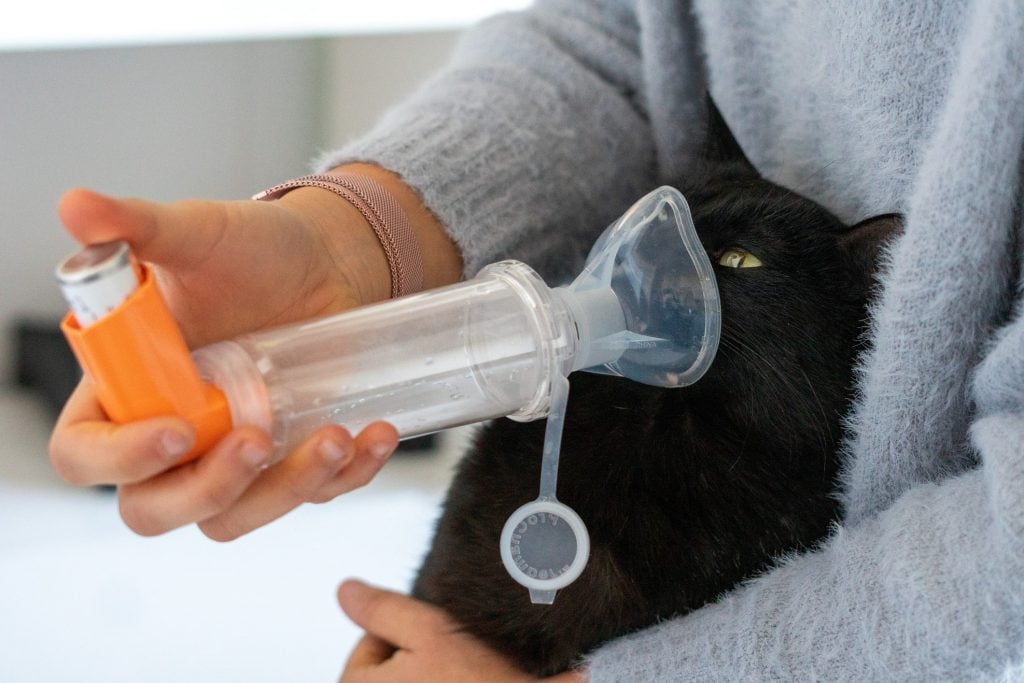- Not a substitute for professional veterinary help.
If you notice your cat panting like a dog after chasing her favorite toy, there’s probably nothing to worry about and her breathing should return to normal after a short break. If the panting continues or doesn’t follow a burst of exertion, that’s a sign to consult your vet.
Learning the reasons behind panting in cats can help you recognize emergency situations and quickly get your cat the help she needs. Here are seven reasons for panting in cats that every cat parent should know.
What Does It Mean When a Cat Is Panting?
Experts at Texas A&M say that in general, it’s a good idea to keep an eye on your pet’s normal breathing rate so you’ll notice changes if they occur. A healthy cat should take about 15-30 breaths every minute when at rest, and you’ll see a spike in this rate when she is playing, hot, or otherwise stressed. If you notice abnormalities in her breathing, including panting, it’s recommended to get to the bottom of the cause ASAP.
1. Your Cat Is Catching Her Breath
Panting after exertion isn’t a big deal. Just like humans after a quick sprint, your cat might need a couple of minutes to catch her breath. If you notice your cat panting during play, simply take a short break and let your cat catch her breath. If the panting continues or is accompanied by other strange behavior like staggering, you should seek medical attention.
2. Your Cat Is Cooling Down
Cats have a few ways to cool down when they’re hot. Sweating through their paw pads and releasing heat through their ears is the body’s first defense against overheating. When cats get really hot they’ll begin panting. This is a cat’s last-ditch effort to battle the heat and is a surefire sign that your cat is at risk of heatstroke. “The first step in avoiding an emergency trip to the vet is to make sure your cat has access to shade and lots of fresh water,” writes our own Zibby Wilder in her article about heatstroke in cats.
3. Your Cat Is Stressed or Anxious
When a cat is stressed, her flight or fight kicks into gear and she gets a jolt of adrenaline to her system. This adrenaline increases her heart and respiratory rate—leading to panting. The list of stressors for cats is long, from a new family member to a change in schedule or routine to travel to the vet. According to PetMD, your cat’s excessive panting due to anxiety may be accompanied by other symptoms such as:
- Tail flicking
- Increased respiratory rate
- Holding their tail tight against their body
- Crouching and leaning away
- Trying to escape or completely freezing in place
- Holding their ears back
- Hair standing up
- Aggression
4. Your Cat Has Asthma
As a Rover sitter, I feel like I’ve done and seen it all when it comes to cat care—including giving a cat an inhaler for asthma! According to Veterinary Emergency Group, asthma in cats is actually pretty common and can include bouts of coughing with panting between the coughing fits. However, if you notice these signs in your cat and it’s new, a visit to the vet is warranted.

Jorge Aguado Martin/iStock
5. Your Cat Has Brachycephalic Airway Syndrome
As the name indicates, this syndrome can occur in brachycephalic breeds, or smooshy-faced breeds like Persian, Himalayan, and Burmese cats. Their smooshy faces are due to shorter bone structures that, while cute, can cause respiratory issues. Mild abnormalities in the small bone structure could cause adorable snoring while more severe abnormalities could cause a cat to choose mouth breathing over inhaling through the nose.
If gone unchecked, brachycephalic airway syndrome could cause secondary inflammation and put extra strain on the heart. Mild cases of the syndrome can be managed with diet and lifestyle changes while more severe cases could require surgery.
6. Your Cat Is In Pain
When your cat is in pain, she might display some atypical behaviors including panting. If your cat’s panting is accompanied by any of these other signs, she should be seen by your veterinarian for a professional evaluation.
- Aggressive behavior
- Rapid pulse
- Excessive vocalization
- Excessive purring (self-soothing)
- Changes in mobility
- Changes in appetite
7. Your Cat Might Be Sick
Your cat could be panting for a handful of reasons, some of which could point to a serious health concern. Here are some illnesses that might be associated with panting in cats:
- Pneumonia or other upper respiratory infection
- Cancer
- Congestive heart failure
- Feline infectious peritonitis (FIP)
- Heartworm
- Anemia
When Should I Worry About Panting in My Cat?
“Panting in cats or open-mouth breathing is never considered normal for a cat,” Dr. Leanne Lilly, DVM, DACVB, Assistant Professor at the Ohio State University tells The Dog People. Unless your cat is quickly catching her breath after pouncing on her favorite mouse, a visit to the vet is recommended. The sooner you respond to emergency situations with your cat, the more likely she’ll fully recover and get back to being her happy, healthy self.
